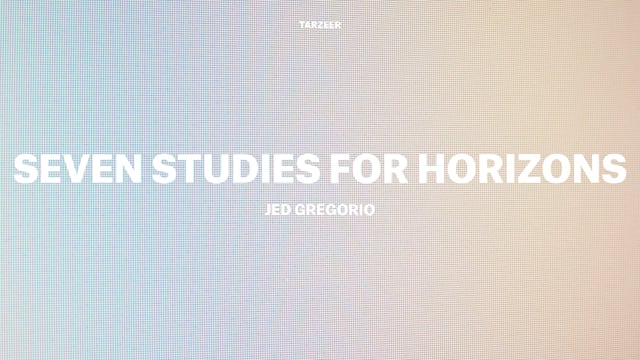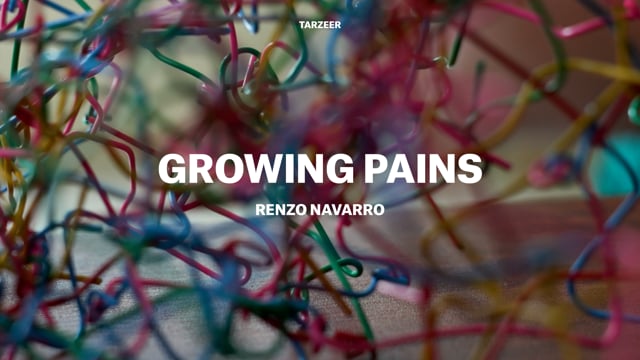
From performative posts to deepfakes, manipulating society and taking liberties with the media is the default state of our time. But how can this same practice be reparative?
Tarzeer Pictures presents new works by Jed Gregorio and Renzo Navarro, two who work with the spectre of sensation and projection through collage.



(L-R) Jed Gregorio, Portrait of a Young Man with a Necklace, Portrait of a Young Man in Gray, Portrait of a Young Man with Round Glasses (details), 2022. Archival pigment print and mixed media on Hahnemühle.
For Jed, it allows him to expand the photograph’s horizon and destabilize the monolithic nature of the conventional image plane through his portraits of young men, fragmented. Reflecting on the long hours of sitting that underpin classic portraiture, in Seven Studies for Horizons he translates stately repose into the immediacy of working with one’s hands — cutting, gluing, pasting, spraying. The stuff at your fingertips.

Meanwhile, nylon, spritely bent paper clips, and a bunch of flowers are strewn together to create a portrait of aging in Renzo’s Growing Pains. His emotions are entangled despite his direction being clear: Invisible nylon strings full of tension and restraint prove not to be so invisible after all.
“Flower arrangements are supposed to give a sense of control. All that is lost.”
— Renzo Navarro —

(L-R) Renzo Navarro,“30-b,” Growing Pains,“88-4,” Growing Pains, 2022. Archival pigment print on Hahnemühle.
There is a domestic scale in both works in the tradition of combining the objects within one’s reach to create meaning. Collecting everyday objects and assembling them by some interior urge (mental, emotional, oneiric, political) can send messages about the liminal.

In Jed’s series of portraits, he asked his friends to sit for him. Testing the thresholds of intimacy, he asks: “What is contained in that transient stillness as one engages the mystery of the other?”

In Jed’s series of portraits, he asked his friends to sit for him. Testing the thresholds of intimacy, he asks: “What is contained in that transient stillness as one engages the mystery of the other?”
While we can draw parallels between his practice and the origins of photo-collage in the Victorian era (when daydreaming women would cut and paste photos of guests from the upper crust into a background that stood for their drawing room; a portrait of themselves, in relation to others), Jed is ambivalent about the psychological meanings ascribed to portraits; that a face when captured intimates an internal universe of private thought. We might instead imagine waves swirling around identity. Fidelity to fantasy in its most robust sense — as the realm of desires, doubts, and dreams.
Similarly, Renzo explores something of the unlived world too: its stuckness.
Continuing his exploration with paper clips as motif and figure, he renders them useless by bending them. By manipulating the shapes of different materials and the tense relations between, Renzo has developed a unique stylistic approach — one that betrays a tendency to reckon with the ephemeral. He has a way of capturing what does not stay.


Similarly, Renzo explores something of the unlived world too: its stuckness.
Continuing his exploration with paper clips as motif and figure, he renders them useless by bending them. By manipulating the shapes of different materials and the tense relations between, Renzo has developed a unique stylistic approach — one that betrays a tendency to reckon with the ephemeral. He has a way of capturing what does not stay.
“What is contained in that transient stillness as one engages the mystery of the other?”
— Jed Gregorio —
Ritualizing symbolic behaviors such as these, over and over, in various mediums, can help a person make sense of the world, and their place in it. Like collage, these practices accept that an image has a life before, during and after its creation. Time and transience interest both.

For Jed, a portrait can contain realities that are not necessarily occurring in the present tense; the work questions his generation’s place in the march of time. For Renzo, the actual sculpture photographed is not the resulting image, but rather a combination of layers from multiple photographs. Time passes, but only in his work.
— Anna Canlas
About
Jed Gregorio (b. 1990) is a Filipino artist who lives and works in Manila, Philippines. His broad artistic practice encompasses photography, filmmaking, installation, and performance. Often informed by themes of politics of religiosity, masculinity, and post-Internet art histories, Gregorio’s free-ranging poetics manifest as serial and anthological projects that span multiple platforms, exhibitions, and diffusions, each operating in a hermeneutical cosmology developed through hyperfictional and multimedia strategies— from discrete works in assemblage and sculptural installation, to spatially expansive milieu constructed with images, objects, sound, and light. Gregorio graduated with a Bachelor of Arts, Major in Communication, from the Ateneo de Manila University in 2011.
Renzo Navarro (b. 1991) is a photographer based in the Philippines who specializes in themes of liminality and transience. By manipulating the shapes of different materials, and through a mastery of light, space, and the tense relations between, Navarro has developed a unique stylistic approach to the abstract—one that betrays a tendency to reckon with the ephemeral. Whether we’re talking about “Sorry I Couldn’t Stay,” where a truck’s metal surface reflects the iridescent lights of an unseen, bygone world, or “Boy Who Eats His Feelings,” a series of still life images that recall the glimmering shores of mythical underworlds, Navarro has a way of capturing what does not stay. One could interpret his work as escapist, hungrily imagining hypothetical elsewheres. It is more than that. Through defamiliarization, Navarro more often than not makes the subject of his work not just what is absent, but absence itself.
TARZEER is a gallery and creative production group based in Manila dedicated to the creation and development of photo, video and image based works made by Filipino artists. Craft and technique, materials and manipulations, practices and progressions, explored.
Works







Edition 2 of 3- AVAILABLE
Edition 3 of 3- AVAILABLE





Edition 2 of 5- AVAILABLE
Edition 3 of 5- AVAILABLE
Edition 4 of 5- AVAILABLE
Edition 5 of 5- AVAILABLE





